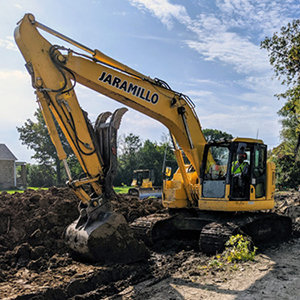Comprehensive Excavation Strategies: Grasping the Fundamentals for Success
The mindful preparation, precise execution, and precise focus to detail needed in excavation projects require a detailed strategy that incorporates numerous essential elements. The true proficiency exists not merely in comprehending these fundamentals yet in perfectly incorporating them to browse the intricacies of excavation projects with finesse.
Understanding Excavation Job Planning

The initial phase of any excavation job is the planning stage, where vital decisions are made that can dramatically impact the result of the job. Understanding the task budget plan, scope, and timeline restrictions is essential for producing an extensive excavation plan that makes sure the project's success.
One key facet of excavation job planning is the development of an in-depth timeline that outlines the series of turning points, tasks, and deadlines. By thoroughly thinking about all these variables during the planning stage, excavation jobs can be performed effectively and successfully, leading to effective end results - dump truck companies in ohio.
Dirt Evaluation and Website Assessment
Conducting detailed dirt analysis and site evaluation is an important action in the preparation phase of any kind of excavation job. Dirt evaluation entails figuring out the make-up, framework, and homes of the soil at the excavation website. This information is essential for recognizing the dirt's bearing ability, dampness web content, and capacity for disintegration, which are essential aspects in determining the excavation approaches and equipment needed for the project.
Website analysis exceeds dirt evaluation and includes a more comprehensive analysis of the total website problems. This examination includes recognizing any type of prospective risks, such as below ground energies, ecological concerns, or unsteady surface, that might influence the excavation procedure. By thoroughly reviewing the site, task supervisors can develop efficient excavation strategies that focus on safety, effectiveness, and environmental management.
Making use of innovative technologies like ground-penetrating radar, dirt tasting, and drone studies can boost the accuracy and performance of dirt evaluation and site assessment. Investing time and sources in these preliminary steps can inevitably save time and stop expensive delays or problems throughout the excavation procedure.
Equipment Choice and Usage
Reliable excavation jobs rely heavily on strategic devices choice and application to make sure optimal performance and efficiency. Selecting the right devices for the job is essential in optimizing effectiveness and reducing downtime. Factors such as the kind of soil, depth of excavation, and task scope play a significant function in establishing one of the most appropriate equipment for the job at hand.

Along with picking the appropriate devices, correct utilization is key to task success. Operators needs to be trained to deal with the equipment safely and effectively - dump truck companies in ohio. Routine maintenance checks and timely repairs assist protect against break downs and make certain consistent performance throughout the project
Precaution and Rules Conformity
In the world of excavation jobs, focusing on precaution and compliance with policies is critical to making certain a safe and secure and legitimately audio functional setting. Precaution include a variety of techniques, including carrying out extensive site assessments, carrying out proper signage and obstacles, and providing appropriate safety training for all personnel entailed in the excavation process. Adherence to guidelines, such as OSHA needs in the USA, makes certain that the excavation job satisfies the required standards to secure workers, onlookers, and the surrounding atmosphere.

Surveillance Development and Adjusting Techniques
How can forecast supervisors successfully track the advancement of excavation projects and adjust their approaches as necessary to enhance outcomes? Monitoring development is necessary for making sure that excavation tasks stay on track and fulfill deadlines.

Conclusion
To conclude, grasping the principles of detailed excavation approaches is crucial for the success of any kind of task. By understanding job preparation, examining soil and website problems, picking suitable tools, adhering to safety regulations, and keeping an eye on progression, job supervisors can guarantee a smooth and efficient excavation procedure. Carrying out these methods will lead to effective results and reduce possible threats or setbacks throughout the excavation job.
The preliminary phase of any type of excavation project is the planning stage, where important decisions are made that can dramatically impact the result of the project. Recognizing the task timeline, spending plan, and scope restraints is essential for creating an extensive excavation strategy that ensures the task's success.
How can project managers effectively track the development of excavation projects and adjust their techniques accordingly to maximize results? By closely keeping an eye on progression and being prepared to adjust techniques, task supervisors can enhance the total success of excavation projects.
By understanding project preparation, evaluating soil and site problems, choosing proper devices, conforming with security policies, and monitoring development, job managers can guarantee a smooth and efficient excavation process.